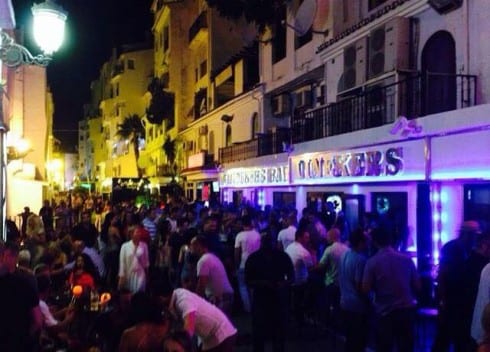 GET your papers in order to take advantage of the dream Spanish lifestyle, writes Leon Cohen in his debut Olive Press column…
GET your papers in order to take advantage of the dream Spanish lifestyle, writes Leon Cohen in his debut Olive Press column…
As it’s my first column, I would like every reader to understand the two simple steps necessary to make your adventure – living in this beautiful country – a memorable experience.
It’s essential for those who wish to have peace of mind as well as making the most of the Spanish lifestyle.
If you want to take advantage of what is available, services such as medical/health, financial/banking, property, business et al, then you will need to accept, that without considering these steps, life could prove rather frustrating and stressful.
Naturally, all of this is for those expats wishing to establish themselves here in for six months or more. Generally, these two steps apply to those coming from both the European Union and further afield, obviously those from the EU will be treated more favourably, governed by less conditions and therefore less paperwork .
Step One; El Padron, Empadronamiento. Registering with your local council (ayuntamiento).
This is a fairly simple process of entering the council offices with proof of address (service bill, rental contract, property deeds) and normally within a week, sometimes less, you will have your notification of enlistment.
This enables you to vote, use free council services, participate and assist in local events and so on. It is always worth asking your town hall for the benefits of this enrollment.
Also, stipulate that you wish to be placed on the electoral register, this document is normally free.
Step Two; N.I.E.(Numero Identificacion Extranjero)
This is the Expats ID card/document obtained from the National Police station (Foreigners Dept). With this in your possession, all becomes possible, from opening a Spanish bank account to contracting a service provider, purchasing a property, working, setting up a business and obtaining free medical attention.
It’s worthwhile making sure you acquire all the relevant paperwork for this. In the majority of cases you will need your passport, a copy, three passport photos, your application form, EX15, a copy, notification of a private health insurance, and for those not working, a bank statement showing a minimum of €5,000.
In some localities, you may find it possible to pre book an appointment, saving some time in waiting. But this is not the norm outside of cities, so be prepared and patient, setting aside sufficient time.
You can also download the form from the Internet, something unheard of 15/20 years ago.
After your appointment, you will be issued with the stamped photocopy of the form and be told to return to collect your ID within two to six weeks. Again, you will need to produce your passport and the stamped copy of the form EX15 for them to issue you with your document. The cost of approximately €21 is payable in the bank, alongside the form issued at the time of application.
Having put yourself through these two tasks, you should feel proud and begin to enjoy the culture and lifestyle that living here provides.
God bless, be well, stay happy…
Any queries, please do not hesitate to drop me a line or call me direct, it’s my business to help relieve the stress and uncertainty, making for a happier expat experience.




Good morning and thanks for an interesting article! I want to live in Spain, Andalucia and Málaga in particular, but am confused about what I need to do if I live there for just under 6 months of the year. What papers do I need and at what stage do I have to submit a tax form? I would be grateful for answers as so far have not been able to get answers and don’t want to omit doing the right thing!
Steep learning curve coming up Timzen!
Timzen, don’t take advice from a forum. Get a Spanish lawyer and ask them.
Don’t buy but rent instead.
So you recommend renting. I have looked and a suitable property will cost me around £10,000 per year as a permanent residence. Over 20 years that will cost more than £200,000 and I still own nothing. So why is renting better than buying ?
It’s true, I have friends who rented for a decade in Marbella. Finally, they decided to buy, and then realised that they had spent 300K already. Then a few months after purchasing they found out their home was removed from the PGOU (local plan) and was technically illegal. In Spain you rarely win with property.
There seems to be some confusion/overlap here between obtaining an NIE number and obtaining residency in Spain.
Admittedly we applied for our NIE numbers in 1998 when things were very different and you did not get a card with the certificate back then but we received our NIE numbers the same day. We just went to the police station, a bloke typed out the certificate and that was it.
An NIE number is purely a tax reference number and it is not compulsory to have private health insurance (although it is sensible, see below) or have €5,000 just to get an NIE number. The paragraph regarding NIE numbers then appears to become confused with applying for residency which is not the same thing. If you are under 60 and wish to become resident, the Spanish authorities will want to see proof that you are either paying into their social security system or have private health insurance. Any requirement to have a certain amount of money in the bank relates to an application for residency, not just an NIE number.
Obtaining an NIE number and/or going on the padron alone do not entitle you to any free healthcare in Spain. The only way to get free healthcare in Spain is to be over 60 and resident or under 60 and paying into their social security system (expensive and costs about €200 per month) or have private health insurance which is brilliant, far better than the UK NHS and only costs us €50 per month each and it covers everything except dentistry. Part timers who spend long periods of time in Spain also need private health insurance because the EHIC card is purely for dire emergencies and only suitable for short holidays.
It is worth noting that unlike the NHS, the Spanish health service is based on contributions, not residency.
Minimum is not €5000, much closer to €50,000, at least for the Temp residency and the renewals thereafter.